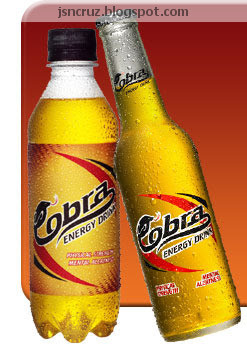Apples and Oranges
Not all hydration sources are created the same. The most basic of these is water; one can never go wrong with drinking just water before, during, and after a workout. Sometimes though, one needs a little bit of help, and this is where specialized hydration sources come in.
Energy drinks are hydration sources that usually contain stimulants which 'wake' you up, increasing both your awareness and heartbeat; basically preparing the body for the 'fight or flight' response. These sort of drinks pump the blood stream with stimulating chemicals - foremost and most usually caffeine - and a whole lot of sugar. This produces very quick energy in a short span of time. Some drinks that come to mind with these properties are Cobra Energy Drink, Red Bull, Sting, and Samurai.
 |
| Not sure if this is relevant, but why do energy drinks come in 'aggressive' packaging? |
Sports drinks, on the other hand, are hydration sources that provide salts and other nutrients lost through water-loss from sweat and urine (and even tears, if the half-marathon is hurting you like hell). These lost salts contribute to painful cramps, fatigue, and sometimes, muscle spasms. It is vital that during prolonged periods of exertion to replace these nutrients as quickly and as efficiently as possible. Sports drinks deliver sodium, potassium, and some vitamins in a quick-to-absorb manner, helping relieve fatigued muscles.Some drinks that come to mind with these properties are Gatorade, 100 Plus, Propel, and Pocari Sweat.
The Right Time
So which one to take?
Since energy drinks contain a lot of stimulants, with some of these chemicals having the side effect of being diuretics (they make you pee. A lot.) I would never suggest taking energy drinks during endurance conditioning, training, or exercises. What happens is that the quick sugar- and caffeine-rush from the energy drinks spike up the heart-rate and encourage water-loss, which then leads to an increased risk for cramps and spasms. From personal experience, the best times to use these drinks are 5-10 minutes before an intense but short weights session. If you are planning to spend no more than 45 minutes to an hour lifting heavy weights with very little rest in between (think interval weights training), then this might be a good drink to take.
However, since sports drinks have much less sugar and stimulants, but a whole lot of salts and nutrients, these will not 'energize' you so much as refresh you. One can easily lose a liter of water from one intense endurance session or a 10k training run, which means hydration is important not just to replace fluids but vital cramp-preventing nutrients as well. For long gym sessions (lasting an hour or an hour and fifteen minutes) or for long cardio sessions, sports drinks are your best bet.
 |
| Your best friend after 60 minutes on the track. |
And Water?
After all has been said and done, remember that both kinds of drinks contain calories. Granted, energy drinks have a ton more calories than sports drinks (a typical energy drink has more than 150 calories per serving; a sports drink has a little under a hundred per serving) but both may not be the wisest pick if your overall goal is to lose weight relatively fast. In that case, just have water. Water is refreshing, virtually free, and has zero calories.
Good luck and have fun living well!
For questions on fitness and conditioning, drop a comment!
Disclaimer:
All opinions on this article are based on the author's personal experiences.
Cobra Energy Drink image from Asia Brewery, retrieved on March 14, 2012.
Gatorade image from CHI Company, retrieved on March 14, 2012.
No comments:
Post a Comment